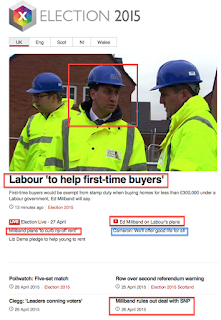Have you event noticed how some football teams develop a habit
of conceding a goal in extra time?
After
watching last night’s three way Leaders Question time, an interrogation by a
balanced and clearly knowledgeable audience, the same thing happened.
It started with Edward Miliband talking about
zero hours contracts but then completely failing to answer the man who ran a
tourist business who, because it’s a seasonal business, couldn’t dream of
taking on people full time.
But he employs
lots on zero hours contracts.
The way Edward
looked quizzically at him as if to say, what kind of bizarre question is that, and
the way he answered him was so alarming for anyone who is in business.
He just didn’t understand how the productive sector
of the economy that actually creates the wealth that allows us to have
hospitals, police, army, international aid works.
He just doesn’t get it.
One problem with Edward is he preoccupied with the wrong
things. Of course inequality is wrong. It’s bad for a society. And he is right to talk about it. But his prescription of attacking those who actually
create the wealth is simplistic and ultimately will be found wanting. His prescription is an increase in taxes such
as restoring the 50p level for high earners and imposing an ill-conceived
mansion tax. There needs to be balance
and he displays none.
But Edwards other problem is he has too often found himself
on the wrong side of the argument. If
you look at an earlier blog on energy prices you see he doesn’t understand how they
work. Maybe it is a sector badly set up
and regulated. But at least understand
how they are set up before trying to change them. He promised to freeze energy prices shortly
before world prices collapsed. So we would be paying higher prices for oil than
the market was selling it for at the moment under his plan.
Then there are the banks.
Yes, I know in partnership with Gordon Brown they brought us to our
knees. And David Cameron’s flourishing
of the Liam Byrne letter reminded us of that. But you need considered reform. What’s the point in taking the moral high ground
then losing the contribution the sector makes to the UK economy. In 2014, financial
and insurance services contributed £126.9 billion in gross value added (GVA) to
the UK economy, 8.0% of the UK's total GVA. The sector's contribution to UK jobs is around
3.4%. And in 2013/14, the banking sector alone contributed
£21.4 billion to tax revenue. That’s a
lot of money a future chancellor is going to have to replace if banks
decided to up sticks and go to Geneva. Now,
I’m not defending the banks. They and
Gordon Brown caused the mess. I’m
saying, have a plan.
At least New Labour understood that markets can be harnessed
to progressive outcomes. It's interesting that at a time of economic challenge, when we look over our shoulder and think we
could have been Greece or Spain, we should even want to think about upsetting the
applecart and give the guy who was Gordon Browns right hand man as they drove us to
the edge of the cliff a chance at the wheel again so soon.
Do we really want a deficit and over spending denier at the wheel? That's what Mr Miliband was last night.
Interestingly, there seems to be a realisation that the last
five years actually have been pretty stable. The FT come out and suggest that “at this delicate moment, the best outcome
would be a continuation of the 2010 coalition between the Conservatives and Lib
Dems…The country would benefit from the countervailing force of Lib Dem
moderation at Westminster. In seats where the Lib Dems are the incumbent or the
main challenger, we would vote tactically for them.”
And the problem for Labour is, it’s their own fault they
will fail in this election. The primary thing
that the British people are waking up to is Mr Miliband has not offered a
credible economic prospectus and would apply a brake on enterprise. So a vote for Labour would bring about a
poorer nation that ultimately would bring about more inequality, the verything that that
Edward is seeking to get rid of.


